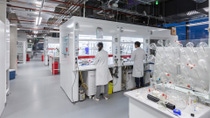News & Media
Major consortium kicks off work to address pressing industry challenges
- BASF and Imperial College London lead Industry Consortium IConIC to develop modern chemical manufacturing methods
- IConIC’s 5 year plan is supported by EPSRC’s Prosperity Partnership programme and looks to advance flow chemistry
- Flow chemistry is a production technique that could potentially revolutionise chemical manufacturing
- Research aims to address pressing chemical industry challenges such as achieving net zero and supply chain resilience
October 2023 sees the start of the work by PhD students on the prestigious Innovative Continuous Manufacturing of Industrial Chemicals (IConIC) project, a five year plan that looks to advance flow chemistry.
IConIC was awarded a Prosperity Partnership in May 2023 by the EPSRC, part of UK Research and Innovation (UKRI), the UK’s public body for directing UK Government research and innovation budget. The consortium on IConIC brings together BASF and Imperial as well as other stakeholders in order to advance flow chemistry, a production technique in which the required reactions take place in continuous operation rather than in batches. This technique could potentially revolutionise chemical manufacturing, much like assembly lines did for car manufacturing in the 20th century.
As a leader in world-scale continuous manufacturing of commodity chemicals, BASF wants to extend its expertise to smaller scales and translate the latest advances in flow chemistry from the R&D lab into industrial practice, with a focus on the production of high-value chemicals, including agrochemicals, which remains challenging. To address potential barriers such as communication across disciplines, IConIC has brought together five additional industrial stakeholders to form a vertical consortium along the value chain. Aligned with the research challenges that cross Chemistry, Chemical Engineering and Computing, this will ensure a seamless translation of the scientific discovery into industrial R&D workflow, and faster realisation of impact.
Christian Holtze, Principal Scientist Flow Chemistry BASF commented, “I‘m delighted that BASF and Imperial College London are leading a consortium that has been awarded EPSRC funding to support research into flow chemistry for 5 years. This research aims to help the chemical industry respond to a range of pressing challenges including achieving net zero, the resilience of supply chains and high energy costs.”
Minister of State at the Department for Science, Innovation and Technology, George Freeman MP said, “Unlocking transformative science breakthroughs, that redefine how entire sectors go about their business, cuts to the core of our mission to make the UK a science superpower. That is why we are supporting BASF and Imperial with £16.5 million to transform the manufacturing of chemicals essential to our economy and food chain. Strong collaborations between the chemicals industry and our world-leading universities, such as this one, can ultimately help us to tackle climate change and cut costs for businesses and individuals alike. Our record £20 billion backing for R&D is all about supporting work like this, taking innovations in manufacturing from the lab to the production line, unlocking benefits for the economy, and the environment, as well as boosting our science superpower ambitions.”
Lead investigator Professor Mimi Hii from Imperial’s Department of Chemistry explains, “Flow chemistry is inherently more sustainable than batch processing because it makes better use of heat and materials. IConIC projects will aim to combine atom-economical chemical transformations with latest chemical engineering technologies and the latest machine learning approaches to accelerate discovery, as well as increasing the efficiency and productivity of continuous flow processes.”
Darren Budd, Commercial Director BASF UK & Ireland added, “With a world class innovation ecosystem, the UK is an attractive hub for R&D in sustainable solutions. This is why in 2023, BASF launched the British Alliance for Research and Innovation, as one of eight global Academic Research Alliances bringing industry and world class academic partners in the UK together. Our IConIC Prosperity Partnership will be a key project to demonstrate how business and academia can come together to co-create and co-deliver research and innovation that address industry-driven challenges and deliver economic and societal impact.”
Thomas Birk, Vice President UK & Ireland BASF concluded, “This is an incredibly exciting project and an example of how much potential R&D holds for progressing our green growth agenda. While academics and businesses work to develop the solutions for net zero, it is just as important that we are able to scale them up. The promising results of such innovative research have to move from lab to reality to benefit advanced manufacturing in the UK and beyond.”
The five-year research will help create important advances in industrial chemistry and help grow a high-tech sustainable chemical sector in the UK and worldwide.
Read more about BASF and Imperial’s partnership here
About Imperial College London
Imperial College London is a global top ten university with a world-class reputation. The College's 22,000 students and 8,000 staff are working to solve the biggest challenges in science, medicine, engineering and business.
The Research Excellence Framework (REF) 2021 found that it has a greater proportion of world-leading research than any other UK university, it was named University of the Year 2022 according to The Times and Sunday Times Good University Guide, University of the Year for Student Experience 2022 by the Good University Guide, and awarded a Queen’s Anniversary Prize for its COVID-19 response.
Further information at https://www.imperial.ac.uk/

